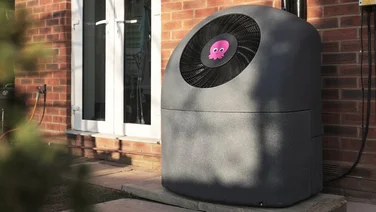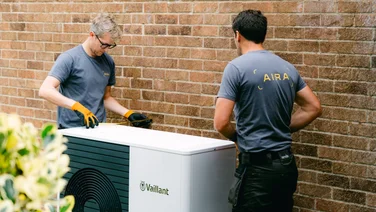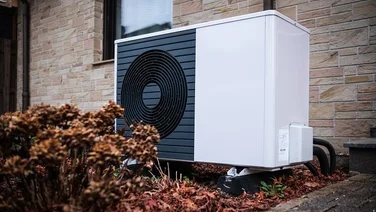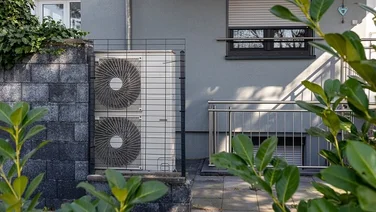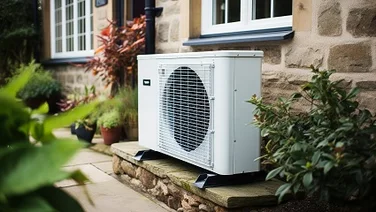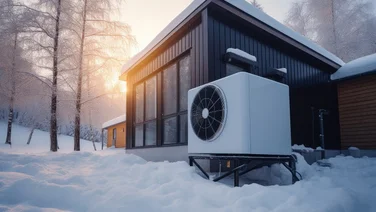We receive a small fee from trusted installers when you request a quote through our site. This helps us keep our content independent, well-researched and up to date – Learn more
- Air source heat pumps are significantly cheaper and easier to install, while ground source models are more expensive but offer more stable efficiency throughout the year.
- Air source heat pumps take warmth from the air, even at -25°C
- Ground source heat pumps extract geothermal heat with pipes
- The Boiler Upgrade Scheme cuts the cost of a heat pump by £7,500
Ground source heat pumps offer higher long-term efficiency and stability, but air source heat pumps are the more affordable and space-efficient choice for most UK homeowners. Whilst air source heat pumps cost less than their green counterpart, the ground source unit tends to be more efficient.
To get a well-rounded perspective on this debate, we’ve explained everything you need to know about air source and ground source heat pumps, and laid out the reasons why you should choose one over the other.
Want to skip straight to the important stuff? You can compare the best heat pumps by popping a few details about your home in our easy-to-use quote tool.
We’ll pass on your details to our expert suppliers, who’ll get in touch with you with free quotes.
What type of central heating do you currently use?
Get started
What is a heat pump?
Are you part of the 51% of UK residents who aren’t familiar with heat pumps? Don’t worry, we’ll explain everything you need to know.
A heat pump is a renewable energy device that takes warmth from the outside world, and uses it to heat – and sometimes cool – your home.
Even when it’s below freezing outside, this machine takes heat from the air, the ground, or occasionally a body of water, and converts it into a fluid.
It heats up this fluid even more with a compressor, before it sends it to your home’s heating and hot water networks – or, if you like, uses it to warm up your swimming pool. You can also pair your swimming pool with solar panels.
You can think of a heat pump as the opposite of an air conditioner, which takes heat from inside your home, cools some of it, and directs the rest outside.
A heat pump runs on electricity, meaning that its ability to save the planet depends on how renewable your country’s electricity mix is.
2020 was the first year that the UK generated more of its electricity through renewable sources (42.9%) than through fossil fuels (38.5%), according to government data, so it looks like heat pumps are only getting better for the climate.
How do air source and ground source heat pumps work differently?
The biggest difference between the two main types of heat pump is that one absorbs the natural warmth contained in the air, while the other takes in the warmth generated underground.
That means the installation process is different for the two machines. Ground source heat pumps need to be connected to underground pipes which absorb the Earth’s geothermal energy.
If there’s room, an installer will fit a horizontal pipe about a metre under the ground’s surface. If you have room for 30m to 50m of pipe to snake its way under your garden, you should go for this cheaper option.
How long does the average ground-source heat pump installation take? Find out and learn much more with our dedicated page.
If there isn’t enough room in your garden, the installer will drill directly down, creating boreholes that usually extend between 90m and 160m into the ground. This allows them to reach a warmer section of the Earth, reducing the amount of piping you’ll need.
If that sounds like a lot, it is – but remember that the land we live on goes down to depths of at least 25km.
Apart from the extra set of pipes, you won’t notice much difference between the two kinds of heat pumps.
Both send hot water to your radiators (and underfloor heating, if your home has it), and both require you to have a cylinder in your property to store the spare hot water they produce.
Both heat pumps also come with a machine that has to be fitted just outside your home, connected to pipes that channel hot water into the property.
Want to get a better idea of what it’s like to own an air source heat pump? Check out our case study with Louise, from South London.
Louise had a 12-kilowatt air source heat pump installed to reduce her reliance on fossil fuels, and received £5,000 off the upfront cost through the Boiler Upgrade Scheme. Now, Louise can enjoy a warm, even temperature throughout the house, without fluctuations.
Take a look at the full interview with Louise to learn more.
Which type of heat pump is cheaper?
Ground source heat pumps have a more extensive installation process, which makes air source heat pumps the cheaper option.
A ground source heat pump costs between £24,000 and £49,000 to install, while an air source heat pump typically costs around £10,000, according to the Energy Savings Trust.
The government’s Boiler Upgrade Scheme can cut the cost of air and ground source heat pumps by £7,500.
However, our recent National Home Energy Survey found that, despite the benefits of the grant, 73% of people are not aware of the Boiler Upgrade Scheme.
When it comes to running costs, the two types of heat pump will cost the same, on average.
Air and ground source heat pumps use around the same amount of electricity to warm your home up, so your energy bill will be the same either way.
Is a ground source heat pump more efficient than an air source model?
Ground source heat pumps are more consistently efficient than air source models because underground temperatures remain stable between 10°C and 13°C year-round.
In contrast – as we all know – the UK’s air temperature varies dramatically between winter and summer, and often over the course of a single day.
Plus, air source heat pumps have to work harder to gather warmth from the air during winter, meaning they’re less efficient when they’re most used.
However, over the course of the year, they’re still just as efficient as their ground-based rivals.
Both have a typical efficiency rating of 300% – which is three times better than the average gas boiler.
What type of central heating do you currently use?
Get startedPros and cons of an air source heat pump
| Pros | Cons |
|---|---|
| Their typical efficiency is 300%, and the best models hit 400-500% | Needs more electricity in the winter to function at the same level |
| Maximum noise level of 42dB – the same as a refrigerator’s hum | |
| Uses as much space as an air conditioner | |
| You can get £7,500 off with the Boiler Upgrade Scheme | |
| Easy to install |
Pros and cons of a ground source heat pump
| Pros | Cons |
|---|---|
| 300% efficiency rate is three times better than gas boilers | Much more expensive |
| Maximum noise level of 42dB – the same as a fridge’s hum | Needs more space outside for pipes, or for expensive 90-160m holes to be bored in your garden |
| Their typical lifespan is 25 years – five more than that of air source heat pumps | |
| You can get £7,500 off with the Boiler Upgrade Scheme | |
| Has a stable efficiency rate all year round, as the ground’s temperature is stable |
Which type of heat pump is best for you?
The kind of heat pump you choose depends on how much space you have outside, how much money you’re willing to spend up front, and the deal you can get on your favoured heat pump.
Ground source heat pumps usually last five years longer, so you should buy one – as long as you can get a serious discount, and as long as you have enough space outside for a winding series of horizontal pipes.
Opt for an air source heat pump if you don’t have enough room in your garden, or if you’ve just found a much better price, which is highly likely.
If you install a heat pump now, you may be able to benefit from the government’s Boiler Upgrade Scheme.
The scheme will subsidise your heat pump installation by £7,500, which allows you to heat your home for less than a gas boiler – with a 44% smaller carbon footprint.
If you want to take advantage of this scheme before funding is withdrawn, just fill out this short form and our expert heat pump suppliers will be in touch with free quotes for you to compare.


